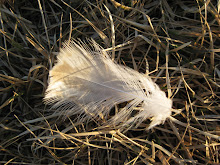Riding the bus is quite an experience in Peru. Becky and I decided to leave the Cusco-Sacred Valley area for Lake Titicaca a couple of days ago. We decided to take a tourist bus because it would be more comfortable than the local bus, but somehow in the confusion at the station in Cusco, ended up on a local bus. Local bus means dirty. Local bus means you can´t go to the bathroom for 6 hours or so. Local bus means lumpy seats. And strangest of all, local bus means anyone who wants to sell something can jump on the bus at anytime and do so.
The first was a teenage boy who played a scallop shell like a washboard and sang some songs for us. He then walked up and down the aisle holding out his shell for money. Next stop he got off and on came a very clean and well dressed young man who proceeded to stand in the middle of the aisle halfway down the bus and address us passengers with great powers of elocution about the problems of alcohol abuse in Peru, and of how important it was to talk to your children, explaining that many parents never talked to their children because they worked so hard, and encouraging them to talk for just 15 minutes a day. I thought he was a Bible thumper, but he never really got too into Jesus into the converation, although it turned out one of the things he was trying to sell was mini Bibles, good for using when you needed something to talk to your children about. He also had a cd and booklet for kids with educational material in them and a book of ideas on how to make money. The very quiet and polite man next to me bought all of his stuff (10 soles, about 3 dollards) and I looked over his shoulder at the kids´book, which looked quite good and interesting. It made me remember how my friend in Lima told me that Peruvian schools were really bad, so maybe material like this is really needed. For awhile I thought the schools were so bad the kids were never in them until I realized they are on summer vacation now!
All kinds of food vendors jump on the bus when it stops, selling bread, empanadas, choclo with queso (corn on the cob with hunks of cheese), and sometimes popcorn. They yell out the name of what they are saying over and over as several of them push up and down the aisle, riding for awhile and then jumping off at the next town. I had seen a lot of sellers like this riding the bus in the Sacred Valley, but had not yet encountered a woman carrying an entire roast pig onto the bus until this trip. She and her friend, who looked to be about 20, got on the bus in the most obscure town, way out in the middle of nowhere with the pig which they proceeded to hack into pieces with a cleaver and sell to hungry passengers along with potatoes. They were also selling apple juice in plastic pags, but I couldn´t figure out how to drink it without spilling it all over myself! In any case, more liquid was not a good idea since going to the bathroom was out of the question.
Last, but certainly not least, was the very well dressed, very clean, very handsome young man who got onto the bus (wearing a tie!) and proceeded to address us about the nutritive benefits of maca, an Andean plant that has caught on big as a supplement in the US. I think Becky and I might have been the only people on the bus who knew what he was talking about, which was one of the points he made. I was very impressed with the way he spoke and with his political awareness of how important it was for the people from his culture to know what treasures they had, and to use them for themselves. I thought it was interesting that he had to explain the medical conditions he was explaining the plant was good for, like osteoporosis, and gave him a lot of credit for jumping on that bus trying to sell his maca powder. I was thrilled to buy some since I have been under the weather, but he didn´t seem to sell as much as the Bible guy.
Finally, we were approached by Oligario who was touting hostels on the bus. I hate to say that I´ve become wary of people trying to sell me stuff, but I have, so I was kind of discounting him until he pulled out a pamphlet for a really nice looking hotel and told us we could have a special deal. It seems like my aloofness payed off. He thought I was trying to bargain! When we got to Puno he found us a cab and escorted us to the hotel, which is quite nice . We are paying ten dollars each for a room in the US that would cost about one hundred. Puno, while rundown, and lacking the colonial charm of Cusco, is interesting to walk around in, cheaper, and filled with very friendly people. I think most tourists spend only a brief time here before jumping off somewhere else, so we have the city to ourselves as far as gringas go.
Off to the island of Amantani tomorrow for two days, then back to Puno for the Festival of the Virgin of Candelaria, one of the biggest of the year!
Subscribe to:
Post Comments (Atom)

No comments:
Post a Comment